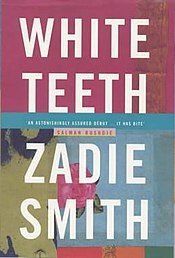 It's really sort of a losing battle to try and keep up with all the good books of recent years while also trying to read older classics, plus books that may not be considered all that extraordinary but that I want to read anyway, like the new WoT books. Still, one has to try, especially if one is admin on this Books board.
It's really sort of a losing battle to try and keep up with all the good books of recent years while also trying to read older classics, plus books that may not be considered all that extraordinary but that I want to read anyway, like the new WoT books. Still, one has to try, especially if one is admin on this Books board.  So when I was browsing my library's English books section a few weeks ago and stumbled upon White Teeth, I remembered having seen that book praised highly - it was included in Time's list of the hundred best books of the past hundred or so years - and so I figured I'd give it a try. Suffice to say, I did not regret that decision.
So when I was browsing my library's English books section a few weeks ago and stumbled upon White Teeth, I remembered having seen that book praised highly - it was included in Time's list of the hundred best books of the past hundred or so years - and so I figured I'd give it a try. Suffice to say, I did not regret that decision. White Teeth is the first novel by Zadie Smith, child of a British father and Jamaican mother, and was largely written while she was in university. As a debut by a young writer, it's impressive to say the least. The novel deals with two families in late 20th-century Britain. One of them, the Jones family, mirroring Zadie's own, the other, the Iqbal family, Bangladeshi. And so it would be fair to say that the most pervasive theme is that of immigrants, and how they fit into modern multicultural societies. Smith does a superb job in dealing with this theme, and all the issues generally associated with immigrants and "integration". For people who are interested in or concerned about the way immigrants (particularly Muslims) are becoming increasingly important in European society, particularly those who are inclined to view said topic in black and white, this book is a must-read.
But the above really does not do the novel justice. People might read that paragraph and think: no thanks, I'm not interested in that topic. Or: nah, I don't like preachy books about contemporary social problems. The good news for them is that White Teeth is much more than just a novel about immigration, and it never turns preachy. Humour is everywhere, ranging from subtle sarcasm and parody to hilarious slapstick and absurd humour. The brilliance of the novel is in the way quite serious themes - not merely the immigration one, but also religion, family, genetics and how they determine one's life - are dealt with in a humourous and entertaining way, without losing depth in the process.
The novel has a fair amount of characters, not all of them equally fleshed out. Some are - intentional - stereotypes or parodies of stereotypes, like the PETA-like veganist hippies, the highly educated mother gushing over her son's semi-delinquent friend and never ceasing to find excuses for his behaviour, and the like. Archie Jones, the protagonist of the first part of the novel, is well-rounded enough in his way, but his most notable characteristic is his colourlessness and weak personality, particularly when seen in contrast with his wife and daughter. The real star of the book is his Bangladeshi friend, Samad Iqbal. Intelligent, flamboyant, but deeply conflicted about his heritage and his religion, and about his twin sons who, each in their own way, deal with those same issues.
I feel like I should say something about the aspects of the novel I found less convincing, what with wanting to write a balanced review, but the truth is these are minor quibbles. At one point, there is a short bit near the end - about one page - of what one might call stream-of-consciousness, or at least an associative, grammar-less description. Though I'm not generally a fan of that, this one didn't particularly bother me, it's just that it's kind of strange to have just one page like that in a novel, out of the blue. And I have to say the ending as a whole was not quite as good in my view as the rest of the book. There was no obvious natural ending point, and so the decision to end rather abruptly (with a cursory epilogue-like glance into the future) was not a bad one in itself, but still I wasn't entirely satisfied. I might change my mind on that in a re-read, though.
White Teeth is one of those novels that manage to be highly readable and entertaining while still being quite deep and of a high literary quality. I highly recommend it, particularly but most definitely not exclusively to those interested in immigration, in the UK or elsewhere, in Islam and its ability to fit into modern western societies, or in the recent history of the UK.
This message last edited by Legolas on 15/11/2010 at 12:10:39 PM
White Teeth by Zadie Smith
- 15/11/2010 12:07:15 PM
6272 Views
I remember loving it when I read it
- 15/11/2010 01:44:07 PM
1524 Views







